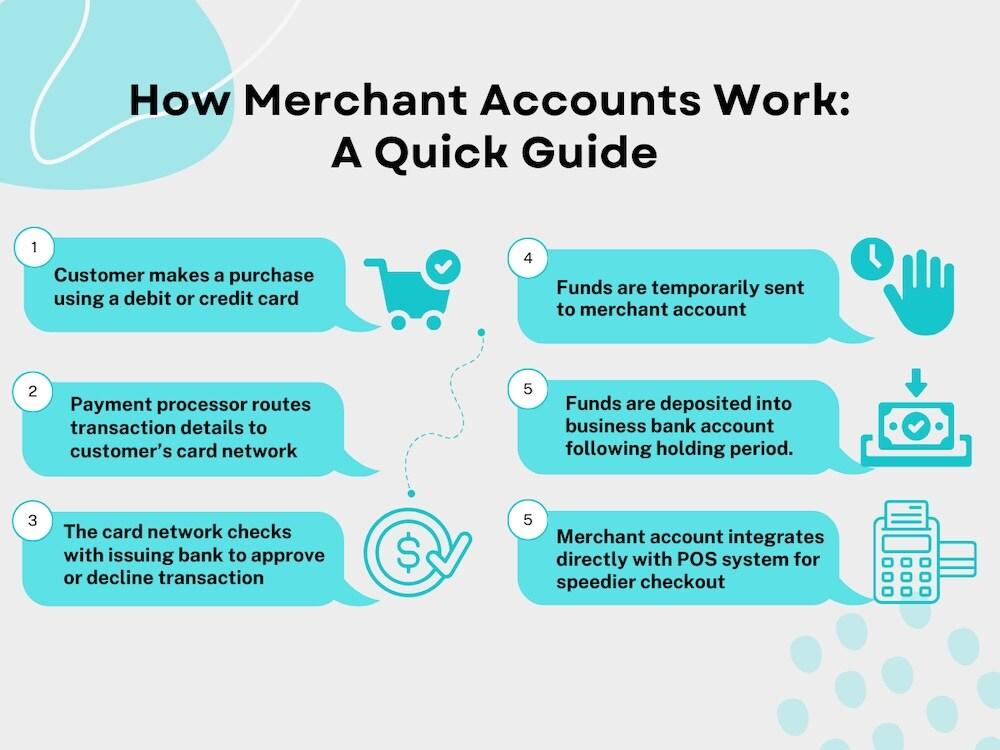To accept credit or debit card payments from customers, your business needs a merchant account. But what exactly does that mean, and why is it necessary?
A merchant account is a specialized business account that handles card transactions. It acts as a bridge between your customer’s card provider and your business bank account, helping to ensure that merchant account processing is smooth, secure, and efficient.
In this article, we’ll explain how merchant accounts work, why they matter for businesses of all sizes, and how you can set one up quickly and confidently.
Level up your payment processing with GoDaddy Payments.
What is a merchant account?
A merchant account is a business account designed specifically to handle credit and debit card payments.
When a customer pays with a card, the funds are first routed to the merchant account before being moved into your business’s main bank account.
This account acts as an intermediary, managing the flow of funds while handling things like transaction approvals, refunds, and chargebacks.
Typically, merchant accounts are offered through acquiring banks, payment processors, or POS system providers.
How does a merchant account work?
When a customer pays with a credit or debit card, here’s what happens behind the scenes:

- The transaction begins when the customer swipes, taps, or enters their card details.
- A payment processor securely sends the payment information to the card network.
- The network checks with the customer’s bank to approve or reject the payment.
- If the charge is approved, the money is directed to your merchant account, where it’s briefly held.
- After a short delay, those funds are transferred into your regular business bank account.
- If you’re using a POS system, it connects to this process to streamline checkout and speed up the sale.
Why do businesses need a merchant account?
A merchant account is essential if you want to accept credit card payments from customers. It’s what allows funds from card transactions to be processed and then transferred to your business bank account.
Many payment methods, including in-person card swipes, online checkouts, and mobile payments, require a merchant account to work properly.
Without one, you can’t process card transactions or get paid through those channels.
Learn more about payment methods that rely on merchant account services.
How to get a merchant account
Getting a merchant account doesn’t have to be complicated. Whether you're just starting out or scaling your operations, the process is easier when you know what to expect.
Here’s a simple step-by-step guide to help you get started:
- Register your business: Before anything else, make sure your business is legally registered with your city, county, or state. This confirms you're operating as a legitimate business entity. Registration is often required before applying for financial services, including a merchant account. If you’re not sure how to get started, here’s a helpful guide on how to register a business.
- Get a business bank account: A merchant account can’t operate without a destination for your funds. You’ll need to open a separate business checking account so that once transactions are processed, payouts can be deposited safely and accurately into your company’s name.
- Research merchant account providers: Take time to compare different providers. Look for clear pricing, flexible contract terms, fraud protection, and compatibility with your existing checkout or point-of-sale system. Some providers specialize in online sales, while others focus on brick-and-mortar or mobile payments.
- Choose a provider that fits your needs: Make sure the provider you choose offers the features your business actually needs, like recurring billing, multi-currency support, or integrations with your POS system. It’s also important to confirm they support the payment methods your customers prefer to use. Looking for a dependable solution for your brick-and-mortar store? Discover how our POS system for retail can help you streamline operations online and offline while also providing customers with a smooth checkout experience.
- Apply for a merchant account. Once you’ve selected a provider, you’ll fill out an application form. You may need to submit your business license, banking details, projected sales volume, and possibly undergo a credit check. Once approved, you’re ready to begin accepting card payments.
While traditional merchant accounts are still widely used, many small businesses prefer to work with a modern payment processor with low fees that handles everything in one place, without needing a separate account. This option is often faster to set up and easier to manage.
How much does it cost to get a merchant account?
The main ongoing expense for a merchant account is typically the credit card processing fees. Other potential costs include:
- Setup fee: One-time fee for account creation
- Monthly minimum fee: Ensures a minimum payment in processing fees
- Monthly/annual fee: Recurring charge for account services
- Early termination fee: Penalty for ending the contract prematurely
- Statement fee: For mailing physical statements
- Batch fee: Charged when daily transactions are processed together
- Chargeback fee: Applied when customers dispute charges
Note that the merchant account provider and payment processor may be the same or different companies. So, if you’re looking to keep your costs as low as possible, you’ll want to look for a payment processor with low fees.
Merchant account FAQ
What is a merchant account example?
A merchant account example could be the account you open through a credit card processor that lets your online store accept Visa and Mastercard payments. Funds from each customer’s purchase go to the merchant account before being transferred to your business bank account.
How long does it take to get approved for a merchant account?
Approval time varies by provider, but it usually takes between 1 to 5 business days. Some low-risk businesses may get approved faster, while high-risk industries might face longer review periods or additional requirements.
Is a merchant account the same as a bank account?
Not exactly. A merchant account is a temporary holding account for card payments. It’s where funds go after a customer pays but before they land in your business bank account. You can't withdraw money directly from it like a standard checking account.
What does it mean when it says merchant processing?
Merchant processing refers to the entire system that allows businesses to accept and manage credit card and debit card payments. It includes the technology, merchant account, and payment processor working together to complete each transaction securely.
Summary
A merchant account is a must-have if you plan to accept credit or debit card payments. It acts as a holding spot for customer payments before they’re sent to your business bank account. While getting one requires a few steps — like registering your business and choosing a provider — it’s a straightforward process.
If you’re looking for a payment processor to pair with your merchant account, consider choosing one with transparent pricing and low fees, which is an especially smart option for small businesses just getting started.







